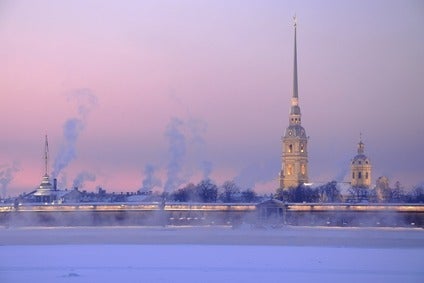Russia continues to maintain its defiance in the face of reports some Western CEOs are bypassing this year’s St Petersburg International Economic Forum (SPIEF).
Set against a chaotic political backdrop of tensions surrounding Ukraine, US and European Union sanctions, as well as what some say is a flight of capital thought to be anywhere between, well, take your pick, US$50bn and an eye-watering US$200bn, SPIEF is boiling with sub-texts.
According to some reports, pressure has been applied to several US companies attending SPIEF in Russia’s former capital not to turn up, while the organisers are insisting the no-showers represent a fraction of the 6,500 delegates, of which there is also a vast legion of 1,500 journalists.
Those 6,500 attendees are due to descend on St Petersburg at what many bill as the ‘Russian Davos’ and it’s true there’s a who’s who of international CEOs on the cast list.
Among them from the automotive world are Gaz Group parent, Basic Element chairman, Oleg Deripaska and AvtoVAZ CEO Bo Andersson, as well as myriad oil companies, this is Russia after all, while the event is also liberally laced with a raft of senior politicians, all keen it seems to declare Russia open for business.
On the logistics side there is the gigantic Russian Railways (RZD), who recently purchased PSA division, Gefco, for around EUR800m (US$1.1bn), while I’m also trying to set up an interview with steel giant, Severstal.
SPIEF realises of course, it can’t completely ignore the external pressures being put on western executives as political pressure muscles in on what is supposed to be a purely economic debate, insisting any non-appearances will not adversely affect relations with the Russian government.
“This does not mean we will close the door to the Russian economy and the Russian market on those companies which will not be coming,” says Russian Federation Deputy Minister of Economic Development, Sergey Belyakov.
“We will, of course, assist them and, unlike the US, we reject any dialogue that involves putting pressure on business, blatant blackmail, or threats.
“We can therefore assure these companies this will have no effect on our relationship with them.”
That uncertainty is reflected in a turbulent Russian automotive market with analysts, LMC, estimating the sector will decline by 10% in 2014 to 2.33m units and remain at around 2.3m units in 2015.
This year’s forecast car market decline also follows a 5% drop in 2013, with the Ukraine crisis spooking the economy and investor confidence.
This week’s conference will undoubtedly address that market volatility as a depreciating rouble and higher interest rates dent consumer confidence – albeit with hopes this is a short-term effect rather than an ingrained trend downwards.
Moscow-based Association of European Businesses (AEB) Automobile Manufacturers Committee chairman, Joerg Schreiber, is also painting a gloomy prognosis, noting the market had fallen back into negative territory.
“It is obvious recent price increases forced by a weaker rouble are taking their toll on a consumer demand, which had been fragile to begin with,” he says.
“In the framework of a sluggish economy, this situation is unlikely to change.”
SPIEF has a job on its hands to convince both delegates and those eying Russia with uncertainty, the current political hiatus is a temporary situation and not long term.
The mega-conference is not just a talking shop either. Organisers will hope they have an impressive headline figure to trumpet, one which even surpasses last year’s reported US$15bn of business that was conducted during the extensive networking opportunities, a point President Vladimir Putin emphasises talking about the event in his home city.
“Over the past several years, SPIEF has cemented its reputation as an authoritative discussion platform,” says Putin.
“Its far-reaching programme has regularly attracted heads of States and governments, business leaders from Russia and abroad and leading experts.
“The debates at this event invariably focus on the most pressing issues facing Russia and the world.”
Those “pressing issues” will clearly form a backdrop to this week’s conference with the country hoping for a return to normality after a decidedly rocky first half of 2014.







